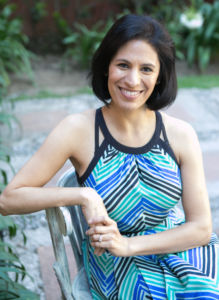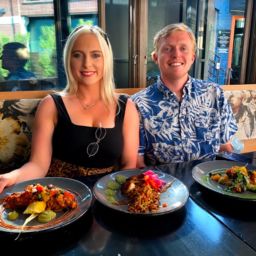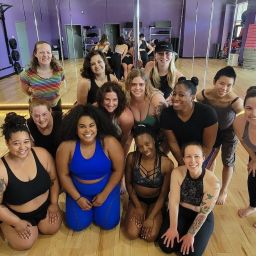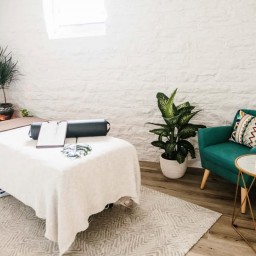
Google “poop well” (at your own risk) and you’ll get 102,000,00 results, plus eyebrow-raising insight into what people desire to know most about their bowel movements. Normally this is where we’d say, “We hope you’re not eating while you read this,” but actually, we hope you are. Because this is a story about the growing field of functional medicine — and a Carmel-based health practitioner whose goals for you are to, “Eat well, move well, sleep well, and poop well.”
In other words, all-systems-go. That’s what functional medicine is all about — looking for the root causes of diseases, and taking a team-based approach to working with patients to create a custom plan to prevent chronic disease and to live a longer, healthier, joyful life — mentally and physically.

Swathi Rao, a certified physician’s assistant and mom of two high schoolers, has been working in family medicine since 2002. Her interest in functional medicine grew out of an experience she had working closely with police officers and firefighters on different shifts to improve their eating and exercise habits, monitor their results from state-of-the-art labs, and watch them encourage each other to make the lifestyle changes that led to better health and job performance.
In 2015, Rao earned a certification in functional medicine from the prestigious Institute of Functional Medicine. Her practice — Be Well Family Care — has grown so quickly that the waiting list can range from 50 to 150 people. That’s why she’s opening a new, state-of-the-art, 9,500-square-foot center (currently scheduled for either late October or early November) at 12430 N. Clark Street in Carmel.
Indy Maven talked to her about what to expect from her new space, why she likes to check out people’s fingernails in public places, and yes, how our conversations about pooping need to change (or rather, start).

Her new building will be a primary care all-ages practice with elements of a health spa. Expect a spacious, relaxing lobby; a teaching kitchen that seats 20; rooms for health and fitness classes; an infrared sauna, and treatments such as bioelectromagnetic therapy.
You’ll meet nurse practitioners, an esthetician, chefs, health coaches who will go grocery shopping with you, yoga instructors, and more. Rao and her team — which also includes an M.D. — offer a mix of traditional and alternative medicine. But: “In most primary care offices, you show up for a physical once a year, and then you go in when you are sick,” she says. “Our modality is to look at the risk factors so that we can, for example, prevent heart disease from happening in 20 years or diabetes from happening in 30 years. Or even eczema from happening next winter.”
You’ll still go to your standard health provider for, say, your mammogram or colonoscopy. But while those are seen as screening tools, “That’s still looking for disease,” Rao says. “Prevention is really digging down deeper and identifying risks.”
That woman looking quizzically at your nails in line at the grocery store? It’s probably Rao. “I’m looking at your nails, I’m looking at your tongue, I’m looking at your hair, I’m looking at your skin,” she says jokingly. “I’m like, ‘Should I tell them about that mole on their…’”
But, in all seriousness: “The zinc deficiency that might be showing up as white dots on your nails today, might be the reason you don’t recover from COVID as easily tomorrow.” Hair, nails, skin, eyes, the inside of the mouth — they all offer valuable information about your current and future health. Rao’s office offers fundoscopic exams (looking into the back of your eyes), and they’ll ask your eye doc for your latest results, because your eye blood vessels can be a window into your risk for diseases such as diabetes or hypertension.
(We’ll pause so you can look at your nails right now, because we know you want to.)
Some of Rao’s patients wanted her to call her business “The Poop Well Practice.” Because apparently, that’s how important this bodily function is to excellent health. “Poop, to me, is another way of saying detox, right? You’d be shocked at how many people come into our office that will be like, ‘I poop maybe once a week,’ or, ‘I run to the bathroom after I eat any meal.’ These are things that people don’t talk about. And they’ve lived this way for such a long time, it becomes part of their norm.” If your doctors aren’t talking to you about your bowel habits, they should. Or, feel free to start the conversation.
If you look at your body as a tree, you want all branches to flourish. And that starts with “the roots.” When she practiced more traditional medicine, Rao spent time looking at her patients “branches.” You have a headache? Anxiety? Diarrhea? Try this. Or this. Now, she looks deeply at the roots, “because sometimes those branches look worse than they really are. And when you go down to the roots, you always start with the gut.”
Rao’s team will want to learn: What do you eat? How do you eat? Mindfully — or while you’re frantically answering emails on your phone? How do you feel after you eat certain foods? What don’t you eat? Do your blood tests reveal food sensitivities? Vitamin deficiencies?
Increasingly, studies show the role that gut bacteria plays in our overall well-being. A gut microbiome that has more bad than good bacteria can trigger an immune system response, which can cause intestinal bacteria and toxins to “leak” into your bloodstream. And that’s been linked to a variety of health issues, from depression and diabetes to diseases such as Parkinson’s and autoimmune disorders that are affecting people at younger ages.
So, here are three “do’s” if you want to be healthier. “Cut out sugar and refined starches in your diet. Increase your phytonutrients, eat a colorful diet, and try to make half your plate be vegetables. Give yourself the ability to sleep well and don’t eat before you go to bed. Try to incorporate at least a 12-hour fast and then eat a good breakfast. I ask most of my patients to try to do a 14-hour fast.”
And here are three “don’ts.” “Don’t drink a lot of alcohol, because it does make a difference for you and your liver. Don’t drink Coke, or anything with high-fructose corn syrup. And don’t judge yourself.”
Good health is about progress, not all-or-nothing perfection. “If we can get 80% of our lives to be really intentional, then we can really enjoy that additional 20% without having any guilt or judgment,” says Rao, who tries to eat 5-6 servings of vegetables daily but who loves salt and indulges in potato chips once in a while. Minus trans fats, of course.
Want to learn more about functional medicine? Rao suggests these books:
- “The Wahls Protocol” by Dr. Terry Wahls
- “Drop Acid: The Surprising New Science” by Dr. David Perlmutter
- “The Disease Delusion: Conquering the Causes of Chronic Illness for a Healthier, Longer, and Happier Life” by Dr. Jeffrey S. Bland
- “The End of Alzheimer’s” by Dr. Dale E. Bredesen
Amanda Kingsbury was raised in an era where mothers called their periods “Aunt Flo,” so do you think she talks openly about her bowel habits? (They’re just fine, thankyouverymuch.)
All of our content—including this article—is completely free. However, we’d love it if you would please consider supporting our journalism with an Indy Maven membership.










